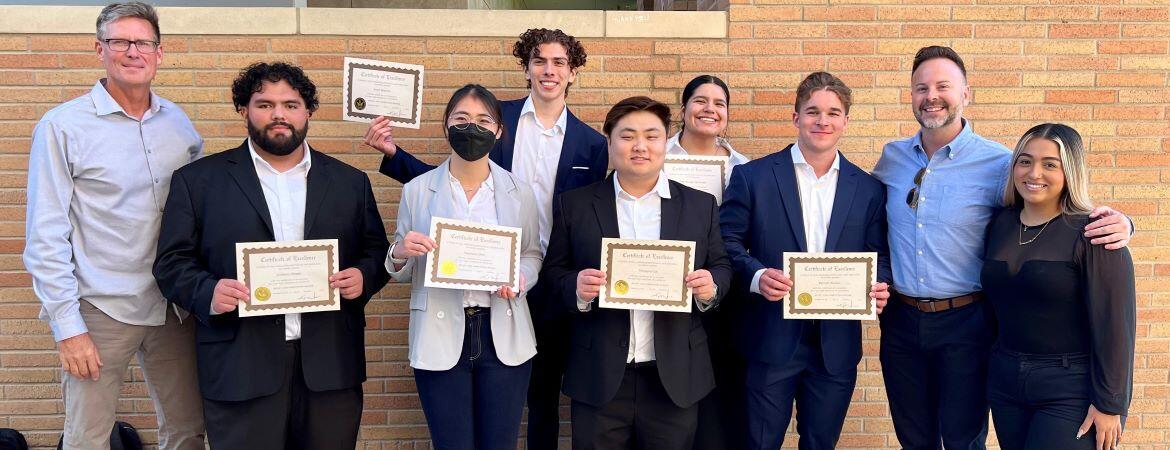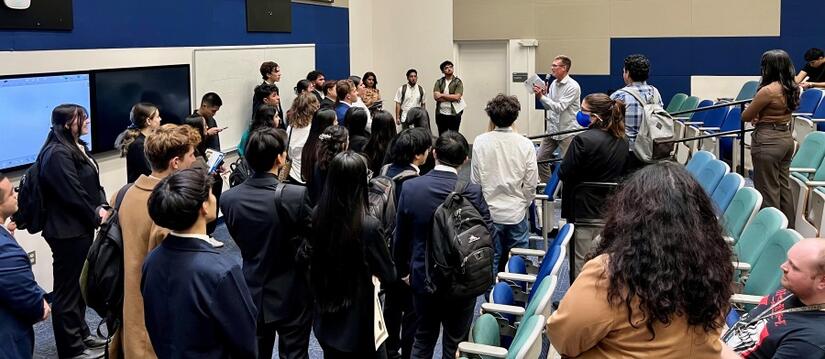
Over the course of two weeks in November and December, 60 teams across the upper-division Organizational Behavior course sections competed in a case competition. The competition required students to take concepts they had learned during the quarter and apply them in a practical and professional setting. Each team spent the weeks leading up to the final round working together to analyze real organizational challenges and propose thoughtful solutions. The final presentations were delivered on December 7 before a distinguished panel of guest judges, who carefully evaluated the teams’ work and ultimately selected the winning team.

According to Kyle Ingram, assistant professor of teaching in management and the instructor for the course, the competition was designed to reinforce the learning outcomes of the class. “Each team was responsible for diagnosing issues and providing solutions for a real organization using course-related concepts covered throughout the quarter,” says Ingram. This experiential learning component gave students an opportunity to see how the theoretical frameworks studied in class could be implemented to address problems faced by businesses in the real world. By approaching their projects from both an analytical and creative perspective, students gained valuable practice in communication, problem solving, and teamwork.
Teaching assistants played a central role in guiding students through the competition process. Each discussion section had its own round of presentations, and teaching assistants were tasked with selecting the top team from their sections to advance to the final. This structure ensured that the finalists represented the strongest performances across all 60 teams, giving the final round a highly competitive and exciting atmosphere. The winning team came from Section 24 and included students Stephanie Chen ’25, Delores Lopez Hernandez ’25, Grant Moreno ’25, Bennett Watson ’24, Emiliano Villegas ’25, and Theodore Yun ’24. Their teaching assistant, Samantha Ruiz ’24 MBA, provided guidance throughout the quarter and supported them as they refined their ideas for the competition.
The panel of guest judges was composed of individuals with direct ties to the School of Business and the competition itself. Among them was 2023-2024 School of Business Executive Fellow Tim Wiseman ’83, who had also contributed earlier in the quarter with a guest lecture. “Tim started the quarter with a fantastic guest lecture and kindly agreed to serve as a judge for the course finale,” says Ingram. Wiseman’s participation was especially meaningful because he was able to share both constructive criticism and words of encouragement with the student finalists. Before announcing the winning team, he provided feedback that helped all participants better understand the strengths of their presentations as well as areas where they could improve for future professional endeavors.
Other guest judges included previous case competition winners Carlos Diaz ’23 and Cade Rubalcaba ’24, whose own experiences in earlier years made them uniquely qualified to assess the current competition. Their presence demonstrated the continuity of the event and highlighted how former participants continue to give back to the program. Additional judges were Snigdha Ojha ’24 MBA, who brought a graduate-level perspective to the evaluation, and School of Business Associate Director of Development Gwen Thibeaux, who offered insights from her professional experience in development and alumni engagement. Together, this diverse panel provided a well-rounded evaluation of the student teams and ensured that the judging process reflected both academic and professional standards.
The Organizational Behavior case competition not only challenged students to synthesize what they had learned in class but also gave them an authentic opportunity to present to professionals and alumni who understood the value of the exercise. By combining academic rigor with real-world application, the event reinforced the importance of collaboration, critical thinking, and communication — skills that are vital to success in both business education and professional careers. Executive Fellow Tim Wiseman’s role as both coach and judge further emphasized the strong connections between the School of Business and its network of alumni and supporters. For the students who participated, the competition was a highlight of the quarter and a reminder of how classroom learning can directly prepare them for leadership opportunities beyond the university.
_______
Header image: Tim Wiseman (left) and Professor Ingram (second from the right) with the winning team in the Organizational Behavior case competition
